German National Arrested In Southern Iran While ‘Photographing’
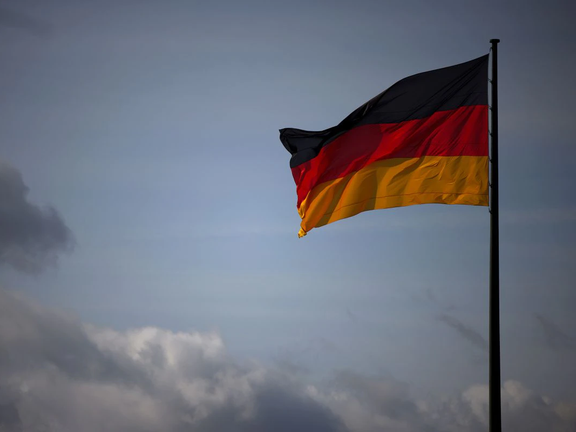
Iranian media say a German national has been detained in the southern Khuzestan province while "photographing sensitive centers".

Iranian media say a German national has been detained in the southern Khuzestan province while "photographing sensitive centers".
Jam-e Jam daily, which is owned by Iran's state broadcaster, reported Tuesday that the person was arrested while taking photos of Omidiyeh oil facilities.
Omidiyeh is home to the Aghajari oil field which is owned by National Iranian Oil Company (NIOC) and operated by National Iranian South Oil Company.
No other details have been published yet, but Jam-e Jam has told it will report more on the issue later.
After the outbreak of protests over the death in custody of Mahsa Amini in mid-September, Iran had detained tens of foreign nationals including those from France, Germany, Italy, Poland and the Netherlands.
Following Supreme Leader Ali Khamenei’s lead, Iranian officials claim the ongoing anti-government protests across Iran are instigated by foreign enemies.
Germany and other European countries have slammed Iran's killing of protesters and increased human rights violations, with proposed plans to designate the Revolutionary Guard as a terrorist organization across Europe.
Meanwhile, several foreigners visiting Iran have also disappeared, confirming earlier reports that the Islamic Republic is taking foreign citizens hostage.
Tehran denies any policy of hostage taking and insists all foreigners are tried according to legal process. However, it has frequently shown readiness for prisoner exchanges and participated in swaps in the past.
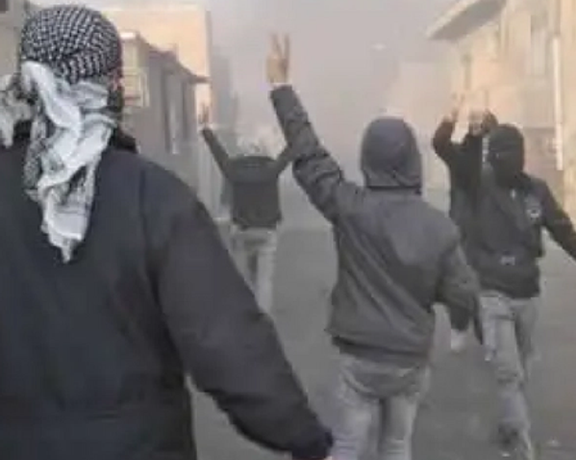
A Kurdish rights group says during the first 15 days of 2023, at least 96 Kurdish citizens have been arrested by Islamic Republic government forces.
Hengaw Human Rights Organization announced in a tweet Monday that 13 children, five university students, four teachers, and five women are among the detainees.
Iranian security forces used excessive and lethal force against protesters in Kurdish regions since the beginning of nationwide protests following the death of 22-year-old Kurdish woman Mahsa Amini in police custody in mid-September.
There are no exact figures on the number of people arrested during the protests across the country, but some sources say nearly 20,000 people have been detained.
Security forces have killed around 500 civilians during the protests, many from Kurdish and Sunni regions in the southeast.
The Islamic Republic’s attacks on Kurds are not limited to the crackdown on protesters as the IRGC has also stepped-up shelling of Iranian Kurdish parties in the Iraqi Kurdistan region.
Back in November, the IRGC launched missile attacks against the positions of the dissident Iranian Kurdish group, the Democratic Party of Iranian Kurdistan in Erbil. At least three missiles hit the party's positions including a hospital, causing casualties.
The Islamic Republic calls the Kurdish armed groups in the western provinces of Iran, "terrorist groups" or "anti-revolutionary" but these groups say that the goal of their armed campaign is "defending the rights of the Kurds".
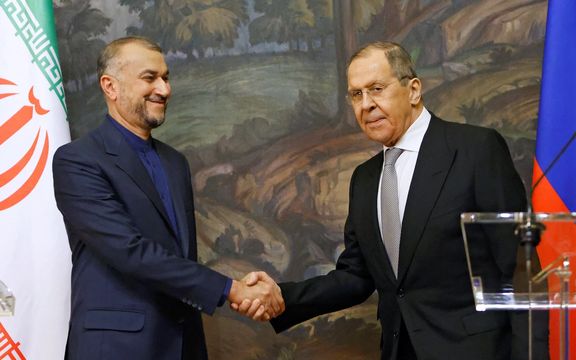
A meeting between the foreign ministers of Iran and Russia, planned to be held in Moscow on Tuesday has been postponed and Hossein Amir-Abdollahian has left for Turkey.
At the same time, an aide to the Russian president Vladimir Putin met with the Ali Shamkhani, secretary of the Supreme National Security Council of the Islamic Republic in Tehran.
Russia, Turkey and Syria have launched diplomatic efforts for an agreement to improve Ankara-Damascus relations, after years of tensions during the Syrian civil war, but Iran has not been invited to take part.
TASS news agency announced that talks between Sergey Lavrov and Hossein Amir-Abdollahian, which were scheduled for January 17, have been postponed "by agreement of the parties".
No explanation was provided about the reasons, but Maria Zakharova, Spokesperson of the Russian Foreign Ministry said earlier that Lavrov and Amir-Abdollahian were going to discuss the JCPOA, cooperation in the United Nations and the Shanghai Cooperation Organization, the situation in Syria, Afghanistan, and other issues.
Meanwhile, Nournews website reported that Putin Aide Igor Levitin met with Shamkhani Tuesday morning.
The details of the meeting have not been reported yet.
The US State Department said last week that Iran is the most important source of security assistance to Russia and that the military relations between Tehran and Moscow have strengthened in the last few months.
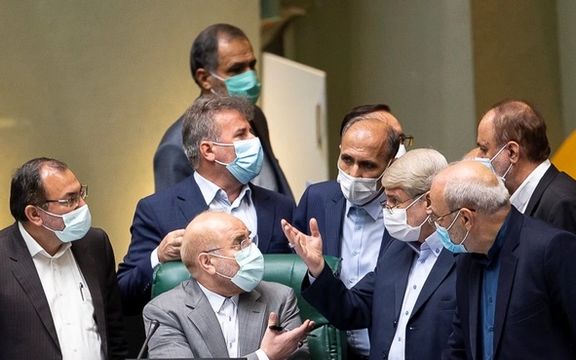
A top Iranian economist has slammed Iran’s so-called five-year developmental plan as meaningless amid overall instability, calling it a bureaucratic exercise.
Well-known economist and academic Mohsen Renani rejected an invitation by the Iranian Parliament's Research Center to work on a new 5-year plan. He said: "I have seen the outlook plan prepared by the Speaker of the Parliament. It is full of wishful thinking without considering the country's ongoing crisis and its potentials. That guarantees the plan's failure."
The economist pointed out that "The government is doing whatever it likes and at the same time writing its own development plan. In my opinion a development plan is meant to promote the economy from a stable lower level stable higher-level. So, a development plan will be meaningful only when a country has stable economic, social and political situation with a promising and reassuring outlook. When we do not have this situation, drawing a development plan would be meaningless."
Renani pointed out that what Iran needs currently is a way out of the ongoing crisis and a solution to bring about stability. "How can we think of a development plan when the rate of exchange for US dollar is likely to reach 500 thousand rials by late March? The situation of government revenues is not clear, the shadow of the war in Ukraine is getting closer to us every day, the talks on JCPOA are terminated, the government is losing its public credibility which is at its lowest level in four decades and capital flight from Iran is gaining momentum." he asked.
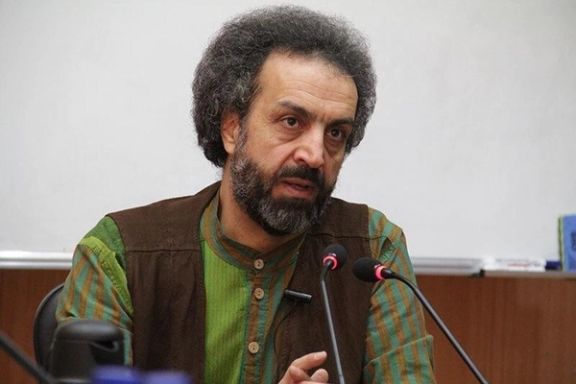
Meanwhile, Prominent Iranian cleric Ayatollah Abdollah Javadi Amoli has said in a critical comment about the Iranian government's behavior: "As long as officials are inefficient and astronomical embezzlements take place, we will most certainly fail."
He added: "We should stay away from wrongdoing, and we should advise others who listen to us not to do anything wrong."
In another controversial comment that mentioned killing of students in schools, people in the streets and the execution of young protesters , Javadi Amoli said "killing children will not help the government," moderate Aftab News reported.
He added: "The economy is a main pillar of the state. A poor nation is like a man without a spine. We need to have money in our pockets if we want to live a decent life."
Meanwhile, a report by the Parliament's Research Center published on Monday said that its researchers believe based on the proposed annual budget bill, that the inflation rate is likely to remain well above 40 percent.
On Wednesday, Ali Khomeini, a great grandchild of the founder of the Islamic Republic warned Iranian officials about the social and economic divides between them and the people as a result of religious pressure on citizens by the hardliners who regard themselves more Muslim than others.
In another development, Ahmad Alireza Beigi, a lawmaker from Tabriz said that a majority of Iranians have no representative in the parliament. In an interview with ILNA, he regretted that in many cases what the Parliament says and wants is miles apart from what the people demand.
He said, "the people are sulking with the government as we are facing a representation crisis in Iran." Meanwhile, referring to demands for changes in the government's economic team as a way of improving the economy, he added that the "Iranian economy is like a broken vehicle, changing the driver will not make any difference."
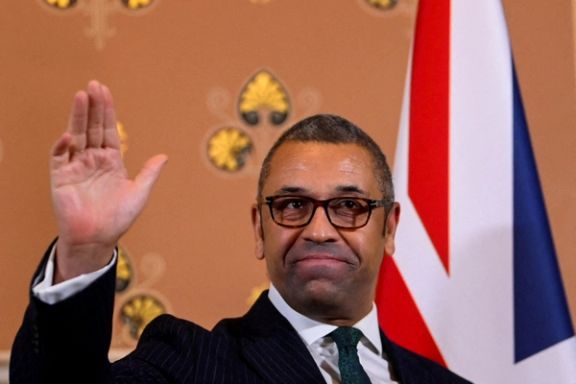
Britain's foreign minister censured the Islamic Republic Monday for luring back British-Iranian national Alireza Akbari and executing him after facing an arbitrary legal process.
Tehran announced on Saturday that it executed the former deputy defense minister, Akbari, after sentencing him to death on charges of spying for Britain’s MI6. Before his death, an audio file was leaked where he claimed to have been tortured for 3,500 hours. Akbari said in the tape the regime had forced him to confess to crimes he had not committed.
Foreign Secretary James Cleverly said in parliament, "They (Akbari's family) have shared his ordeal. An ordeal which began just over three years ago when he was lured back to Iran,” adding that "He was detained and then subjected to the notorious and arbitrary legal process of the (Iranian) regime."
In his statements to the House of Commons, he condemned the “cowardly and shameful” execution of Akbari, warning Tehran that “The world is watching you and you will be held to account.”
Akbari had been deputy defense minister under the reformist President Mohammad Khatami, from 1997 to 2005. He was an advocate of the Iran nuclear deal known as the JCPOA that was eventually signed in 2015 with world powers.
“Let there be no doubt, he fell victim to the political vendettas of a vicious regime,” he pointed out, noting that “His execution was the cowardly and shameful act of a leadership which thinks nothing of using the death penalty as a political tool to silence dissent and settle internal scores.”
Cleverly mentioned actions the UK took in reaction to the execution, summoning of Iran’s chargé d’affaires to the Foreign Office “to make clear our strength of feeling. Our ambassador in Tehran delivered the same message to a senior Foreign Ministry official.” He added that ten other countries have publicly condemned the execution, including France, Germany and the United States, and the European Union. “I am grateful for their support at this time,” Cleverly said.
Following the execution, the UK has imposed sanctions on Iran’s prosecutor general Mohammad Jafar Montazeri. Cleverly told British lawmakers that Montazari. “His designation is the latest of more than 40 sanctions imposed by the UK on the Iranian regime since October, including on six individuals linked to the revolutionary courts, which have passed egregious sentences against protesters, including the death penalty.”
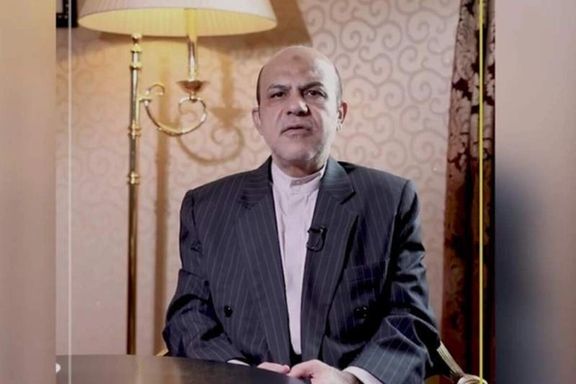
“In addition, I have temporarily recalled from Tehran His Majesty’s ambassador, Simon Shercliff, for consultations, and we met and discussed this earlier today. Now we shall consider what further steps we take alongside our allies to counter the escalating threat from Iran. We do not limit ourselves to the steps that I have already announced,” Cleverly added.
Expressing solidarity with the brave and dignified people of Iran who demand their rights and freedoms, Cleverly said, “Akbari’s execution follows decades of pitiless repression by a ruthless regime.”
“Just how much courage that takes is shown by the appalling fact that more than 500 people have been killed and 18,000 arrested during the recent wave of protests. Instead of listening to the calls for change from within Iran, the regime has resorted to its usual tactic of blaming outsiders and lashing out against its supposed enemies, including by detaining a growing number of foreign nationals for political gain. Today, many European nationals are being held in Iranian prisons on spurious charges, including British dual nationals,” he highlighted.
Following the execution, The Sunday Telegraph said the UK is reconsidering its support for the 2015 nuclear deal known as the JCPOA, dealing another blow to the chances of reviving the accord. Britain has been a key player in the talks on restoring the Obama-era deal, abandoned by former US President Donald Trump.
“During the time we have been dealing with it, the landscape and proposition has completely changed – largely because of the behavior of the Iranian regime,” a government source said and enumerated Iran’s behavior including military support for Russia, interventions in the Middle East and expanding its nuclear program.
Cleverly is also set to travel to Washington DC on Monday for talks with US Secretary of State Antony Blinken where the two will discuss Iran.
Akbari’s execution is a major escalation in tensions between the West and the Islamic Republic, which were already sour over Tehran’s crackdown on nationwide antigovernment protests and its military support for Russia’s invasion of Ukraine.
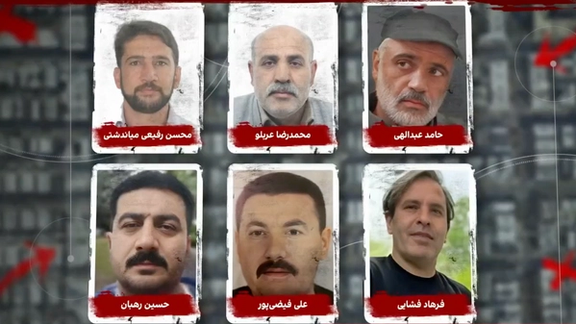
Iran International has obtained information about perpetrators of a botched operation by the Revolutionary Guard to assassinate an Israeli citizen in Georgia in November.
According to the new information, five individuals were the main members of a hit squad from the Quds Force Unit 400 of the IRGC, who sought to kill Itsik Moshe, a prominent businessman and the chairman of Israel Georgia Chamber of Business. Hacker group Backdoor (3ackd0or) provided Iran International with documents about their identities, place of residence, etc.
The five agents were Hossein Rohban, Mohammad-Reza Arablou, Mohsen Rafiei Miandashti, Farhad Fashaee and Ali Feizipour.
Moshe is also the chairman of Israeli House, the organization concentrated on public diplomacy for Israel in Eastern Europe, tasked with communicating directly with citizens of other countries to inform and influence them so that they support the Israeli government's strategic objectives.
Unit 400 of the Quds Force -- a division primarily responsible for extraterritorial military and clandestine operations – planned assassination of some Israeli officials in several countries, and a Pakistani team affiliated with al-Qaeda was tasked with gathering information in the operation in the Georgian capital Tbilisi.
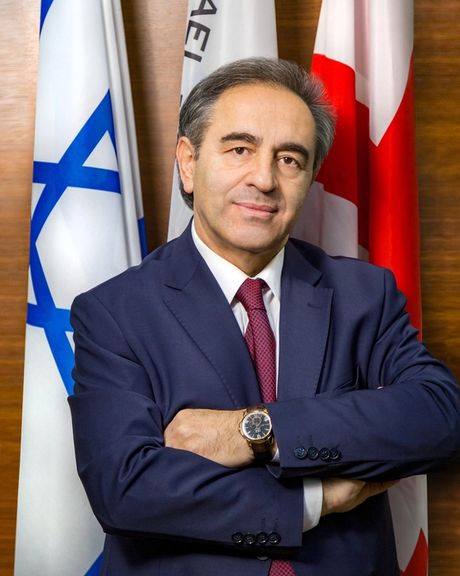
The operation was revealed when Georgian security forces noticed the suspicious activity of a member of the Pakistani team. The State Security Service of Georgia released a statement in mid-November saying that two Iranian-Georgian citizens -- Miandashti and Fashaee -- who were responsible for providing weapons for the assassination were arrested. They were cooperating with an arms smuggler in Turkey.
Georgia also said the one who ordered the murder – Rohban – was outside Georgia. According to data leaked by the 3ackd0or, he is residing in the northwestern city of Orumiyeh (Urmia). Arablou was also responsible for coordinating the team and is reportedly living in the city of Zanjan.
The leader of the team – Rohban -- was under the direct command of Hamed Abdollahi, the head of the Unit 400 who is wanted internationally following the disclosure of an assassination plot targeting Adel al-Jubeir, the former ambassador of Saudi Arabia to the United States from 2007 to 2015. Abdollahi, who used to serve as the IRGC commander in Zahedan and also served as a deputy to slain Quds commander Qassem Soleimani, is also sanctioned by the US following the failed assassination.
Most of the members of the Quds Force Unit 400 of the IRGC were former comrades of Soleimani in the 41st Tharallah Division in Kerman, who later gathered under the title of Haj Qassem's guys. Soleimani – who was killed by a US air strike on January 3, 2020 -- was in charge of supporting and organizing militant proxy forces, including the Lebanese Hezbollah and Iraqi Shiite militia groups that were repeatedly attacking US forces in Iraq and elsewhere.
The news from Georgia came months after Israeli and Turkish intelligence agencies worked together to stop an Iranian plot to assassinate Israeli tourists in Istanbul. Jerusalem warned Israelis not to visit Turkey in June, and soon after, Turkey arrested eight members of an Iranian cell in hotel rooms in a popular tourist district, with weapons and ammunition.
In October 2021, Cyprus foiled an Iranian plotto attack Israelis, including billionaire Teddy Sagi, which Tehran denied. Cypriot authorities arrested a Russian-Azeri man who had a loaded pistol with a silencer in his rental car.
In recent years, there are numerous reports about assassinations of Iranian military commanders and sabotage attacks in Iranian industrial complexes, attributed to Israel, as well as numerous failed attempts to assassinate or kidnap Israeli officials in many countries. Iranian officials claim that they have dealt serious blows to Israel, but they cannot announce them due to confidentiality.